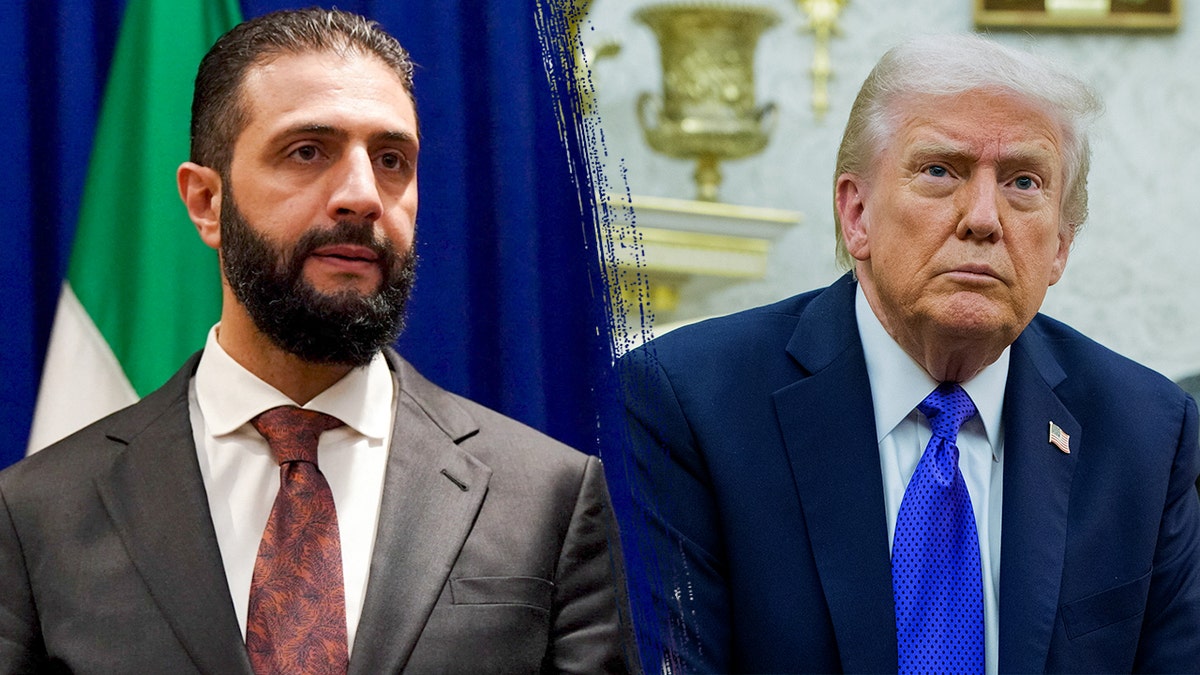
NEWYou can now listen to Fox News articles!
The United States has a rare and decisive opportunity to safeguard Syria’s endangered religious minorities, as President Donald Trump meets with Syrian leader Ahmed al-Sharaa at the White House Monday.
This marks a significant step in Syria’s turbulent history following the fall of the Assad regime last December.
Championing a federated system of governance that decentralizes power will help secure the survival of Christian, Druze and other vulnerable communities. Until decentralization efforts are established, self-defense capabilities for these religious minority communities are essential to protect them from sectarian violence and “religious cleansing.”

President Donald Trump is expected to meet with Syria’s interim President Ahmed al-Sharaa at the White House. (Bing Guan/Pool/AFP via Getty Images; Aaron Schwartz/CNP/Bloomberg via Getty Images)
As a fresh Syrian government looks to rebuild a nation fractured by years of civil war, and after a summer of heinous persecution, President Trump’s role in ensuring the fate of Syria’s religious minorities, particularly the Christians, has never been more crucial.
DON’T LOOK AWAY AS ISLAMIST REGIME IN SYRIA ALLOWS SLAUGHTER OF CHRISTIANS AND DRUZE
In June, a suicide bomber walked into a Greek Orthodox church outside Damascus and detonated his explosives. The force killed 25 and left 65 wounded in its wake. The grief-filled congregation sorted through the bodies of worshipers scattered among the shards of stained glass and rubble, the eyes of the Holy Prophet Elias icon looking down over the bloodied church. Charred Bibles and shoes blown off the victims’ feet were piled up, a grisly monument to the horrific carnage.
Only one month later, the Greek Melkite Church of St. Michael, located in the predominantly Druze region of Sweida, was ransacked and set ablaze. The flames consumed the holy sanctuary and sparked a new wave of religious violence.
Before the civil war began in 2011, more than 1.5 million people, 10% of Syria’s population, were Christians. Today, as few as 300,000 Christians remain.
Syria is the oldest home of Christians outside of Israel. It was on the road to Damascus that the Apostle Paul famously was called by Christ. It was in Antioch (now in modern Turkey) that the followers of Christ were first called Christians. The Patriarchate of Antioch was the first of the pentarchy in the early centuries of the Church.
Syria is the cradle of Christianity. Christians cannot stand idle while its most ancient traditions and peoples suffer.
PRESIDENT TRUMP’S HISTORIC PEACE PLAN COULD RESHAPE THE MIDDLE EAST – BUT WE NEED TO ACT FAST
For Christianity to vanish from Syria would be like philosophy fading from Athens or liberty from America – it would mean erasing one of the living foundations of Western Civilization.
And while geopolitical implications persist, the question is no longer if Syria’s Christians will survive, but how long can they endure relentless oppression without significant reform. The price of cooperation with the United States should be a commitment from al-Sharaa to secure the protection of Syria’s religious minorities.
Since lifting sanctions in June, President Trump holds the political leverage to make hybrid governance a condition for limiting future sanctions or providing reconstruction aid.
By modeling a blueprint of existing local councils managing day-to-day affairs supported by regional authorities, reconstruction in Syria presents a unique opportunity to enhance national unity by first stabilizing local communities, giving Christians and other religious minorities a voice in their governance.
This approach ensures U.S. support for rebuilding while also protecting human rights in vulnerable communities.
HOW TRUMP’S RELENTLESS MIDDLE EAST GAMBLE FINALLY FLIPPED THE SCRIPT
The new Syrian leadership would be wise to engage this model of governance.
A federated Syria would consist of autonomous provinces, each with the power to govern itself and protect its people. Syrian Christians are often left unprotected. Federalization stabilizes minority groups, so that no one single group, be it Alawite leadership remnants of the Assad Regime or HTS militants, can dominate through force. The parliamentary elections in Syria this year exacerbated these concerns, with minority groups citing a lack of representation in what feels like an “attempt to reproduce the dictatorship.”
Northeast Syria offers a working example of what federalization can achieve. In areas once ruled by ISIS, its local councils have built stability by ensuring representation for every community – Kurds, Arabs, Christians and Yazidis alike. These structures have fostered peace and social trust where chaos once reigned. Dismantling them would erase years of progress. Instead, incorporating this model into a national federal framework would strengthen the country’s unity without returning to centralized control or empowering remnants of the old regime.
Syria has historically had a more integrated society. This provides an opportunity to lay a solid foundation for decentralization that ensures local autonomy while still respecting national identity and without undermining the state.
Syria’s complex set of players, including Russia, Iran, Turkey and the U.S., are more focused on strategic alliances and territorial control than deepening sectarian divides. This gives Syria a unique opportunity to establish a decentralized model that can stabilize internal and external interests and protect its minorities.
CLICK HERE FOR MORE FOX NEWS OPINION
Al-Sharaa’s radical opposition to federalization stems from his view that local autonomy would threaten national unity and sovereignty. But federalism is actually the way forward to maintain a diverse Syria. Without local control and protection, religious minorities, particularly the Christians, will all be forced to flee, as they have virtually everywhere else in the Middle East.
The Syrian model should show a new way for religious minorities to survive in the region.
Balancing local self-governance with national unity will create a future where religious minorities are no longer at the mercy of groups in power, but instead empowered to defend themselves and cultivate a stable, pluralistic society. The Kurdistan region of Iraq is a highly successful model of how this could work in Syria.
CLICK HERE TO DOWNLOAD THE FOX NEWS APP
Tears of Syrian Christians – of mothers tending graves, fathers wandering through debris, and sons and daughters lost to exile – water a land familiar to the slaying of the innocent. As the hour of peace dawns through President Trump’s meeting with Al-Sharaa, we pray it’s a durable peace for all Syrians, majority and minority.
Decentralization is not just another option. It is a necessity if Christians are to remain in this ancient homeland.
CLICK HERE TO READ MORE FROM SAM BROWNBACK
Nadine Maenza is chair of the Institute for Global Engagement, co-chair of the International Religious Freedom Roundtable and former chair of the U.S. Commission on International Religious Freedom.




Discount Applied Successfully!
Your savings have been added to the cart.